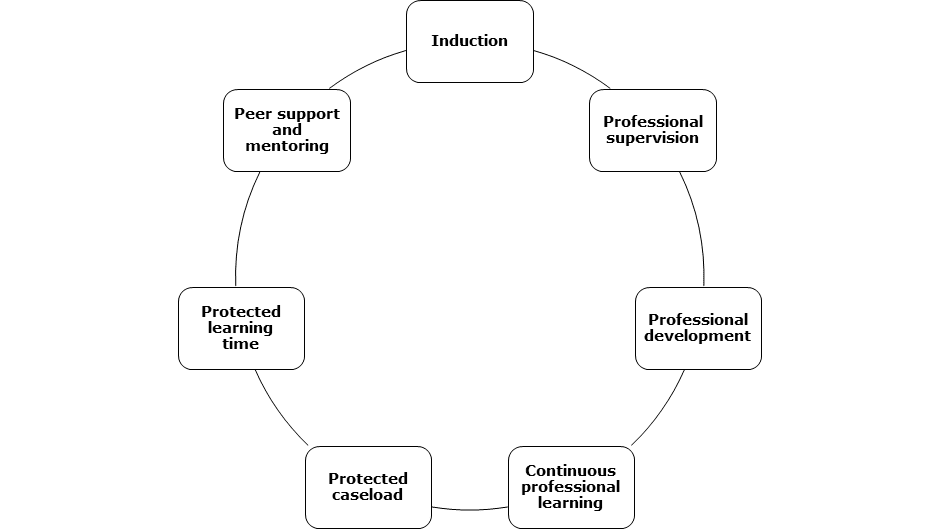Our national approach to the NQSW Supported Year
The NQSW Supported Year is a best practice model to support newly qualified social workers transition to the workforce and ensure an increasingly confident and competent workforce for people who use services, their family and carers.
It provides NQSWs, their supervisors and employers with a consistent and robust framework for supporting the continuous professional learning and development of newly qualified social workers and builds on the existing responsibilities including supporting transition to employment, induction, supervision and professional development.

Newly qualified social workers are entering an environment that can be complex, ambiguous, and unpredictable. They require support and direction to successfully navigate the competing pressures, demands and expectations of their professional role.
Employers and senior leaders will have a critical role in the successful implementation and delivery of the NQSW Supported Year to achieve the aim of a consistent and robust appropriate experience for NQSWs joining the social work profession. Given the current context, it is more critical than ever to have a nationally agreed approach to supporting the professional identity of social workers and retaining them within the workforce.
We are now in the final phase of the project with implementation by October 2024.
We are currently refreshing and rebranding the website to make it more user friendly. In the meantime, you can find some of the information from the work so far below.
A national approach
The NQSW Supported Year sets out the approach NQSWs, supervisors and employers will be required to follow to meet their respective responsibilities in addressing the continuous professional learning (CPL) and development requirements of NQSWs at this stage of registration.
It builds on the existing responsibilities of course providers, NQSWs, employers and the SSSC, including supporting the transition to employment, induction, supervision and professional development, and the management of registration requirements.
The approach defines support that is required to be provided by employers and engaged with by NQSWs. Employer support includes induction, professional supervision, professional development, continuous professional learning, protected caseload, protected learning time, peer support and mentoring.
This support enhances the consolidation and development of the NQSW’s professional social work practice in line with their responsibilities as employees and registered social workers.

The approach includes regular professional supervision and structured professional development discussions, using an agreed set of Core learning elements for social workers: NQSW descriptors and mandatory learning activity for NQSWs to plan and review professional development.
It is intended to align with existing employer’s annual professional development review process or support the creation of one. The validation and endorsement of the NQSWs progression against the mandatory core learning element activity is determined by supervisors and employers.
The approach recognises professional learning as lifelong. The formative nature of the approach focuses on evidencing the incremental consolidation and advancement of an individual’s social work professional practice during and beyond the NQSW Supported Year.
The tools and resources that we develop can be used to supplement existing arrangements in place which are aligned to the NQSW Supported Year or support the creation of one.
National implementation
The Scottish Government is committed to the national implementation of the NQSW Supported Year by October 2024. The Scottish Government is working with key partners through the newly established NQSW Implementation Partnership. The Partnership will work together to ensure the necessary supports and systems are in place, including guidance and materials, in order to have the best opportunity to achieve successful implementation.
Effective Transitions from university to employment as NQSW
Both HEI’s and employers have a key role in supporting NQSWs to develop solid foundations at this formative stage in their career as a social worker. NQSWs learning and development needs to start with supporting effective transitions from qualifying education to employment.
Consistent use of individual learning plans is central to this and the HEI’s are embedding an agreed transitions curriculum within their programmes. A focus on the transferable skills, experiences and learning needs identified during the NQSW transition from qualifying training to employment will help shape the NQSW’s Supported Year.
Supervision and professional development for NQSWs
Regular professional supervision and structured professional development process are core elements of the model. NQSWs and supervisors will use structured professional development discussions to plan and formally review the development of the NQSW against the agreed set of Standards
We have developed a suite of resources for supervisors and for NQSWs to support professional supervision. You can find these on the NQSW – the supported year in Scotland page and the Supervisors and managers page of this website. You will find a broad range of information along with tools and templates that you can download. There are also training materials that can be used within organisations.
Core learning elements for social workers: NQSW descriptors
The core learning elements for social workers: NQSW descriptors reflect the core characteristics of social work practice that are expected to develop at the NQSW career stage. They relate to the consolidation and further development of the knowledge, skills, values and ethical practice accessed during formal social work education and outline the foundation of professional social work practice at this early career stage.
The mandatory learning activity associated with the core learning elements provide a framework to plan development and support NQSWs to meet their CPL learning requirements. The core learning elements are a useful tool for framing development discussions.